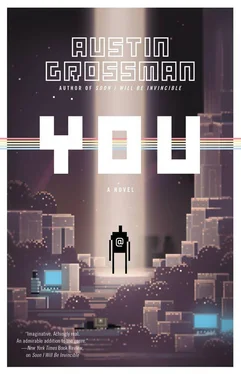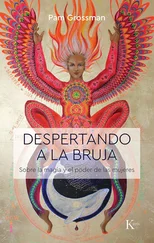You had to really love computer games to get excited about a game this crappy, to really invest in this little shifting grid of letters as an alternate world, but Simon obviously did, believed in it to the point where the real world seemed like a gray shadow by comparison. I’d driven past his one-story house, at the shabbier end of our mostly affluent suburb. Simon slept on a pull-out couch in the living room.
When Darren’s parents bought him a Commodore 64 Simon began sleeping over at Darren’s at least three nights out of the week. When he wasn’t there he was visibly fogged over. I’d see him eating lunch in the quad, blocking out code in a notebook. More than once I saw him in Radio Shack, standing up at a floor-model computer, typing furiously, trying out this or that idea, glancing over his shoulder at the salesperson hovering and waiting for the right moment to kick him off.
March and April passed, and Simon and Lisa mumbled through their bar and bat mitzvahs. The differences between Simon and the rest of us were getting more obvious. Simon probably wasn’t going to college.
Over the next four months he and Darren wrote an enormous amount of code, mostly between the hours of midnight and four in the morning, sometimes individually, sometimes on the phone to each other.
When I was with them, I never before or since had the experience of concentrating so fluidly or intensely. There were nights when, midsession, one or another of us jerked up from a momentary sleep trance, still typing out dense functions with names like SPIRAL-BOUND, PROPHET, and CORINTHIAN, the purpose of which we would know fleetingly once and then never again. What came out of it was a shockingly flexible simulation and procedural content-generation engine, elements of which survive today. It generates random encounters, manages some of the large-scale flow of the game world, and controls interactions between objects, character attributes, and what players can and can’t do. Countless Black Arts programmers have thrown APIs and GUIs on top of it, added functions that search and query and parse output; they’ve added graphics, physics, and sound engines to display the world WAFFLE imagines. But nobody knows what makes WAFFLE quite so fast, and eerily acute in its heuristic take on large-scale simulation problems.
There is a core there—so compressed as to be molten and illegible, forged by a now-alien cognitive self, a mix of hubris and anger and innocence and catalyzing hormonal change—that simply can no longer be understood.
It was the first time I walked through the empty halls of the high school at five in the afternoon, the silence almost ringing in my ears, the place seeming for the first time like it belonged to me, belonged to me only.
It was the first time I stayed out past midnight, feasting on Sprite and M&M’s, playing Styx on repeat, the cassette tape clacking and reversing itself each time “Too Much Time on My Hands” came to an end. Our communal sound track was anchored by Led Zeppelin and a great deal of Pink Floyd, and by artists whose ponderous sense of grandeur made its way into the game’s thematics. Jethro Tull showed up on mix tapes, and, let’s face it, a certain amount of Styx. Punk was never more than a distant rumor.
The first time I was alone with a girl in a car was when Lisa gave me a lift home from Darren’s at one in the morning. His parents were sleeping, so we whispered our good-byes to Darren, then walked in cold starlight to her car, giddy and pale with sleeplessness. I was wrapped in my parka; she was wearing a black overcoat on top of a flowery dress. I didn’t know cars, but hers seemed huge and comfortable and expensive.
She ran the engine a few moments to warm it up. I told her the lefts and rights, but she didn’t say anything—it seemed she didn’t talk when she didn’t have to. She looked tiny at the steering wheel. She rolled to a full, exacting halt at every intersection, crunching on yesterday’s snow.
It was the first time, also, that I had to get out of a car when I wanted to stay sitting there forever, the first time I looked up at the black sky while the car pulled away, and the first time I hung around outside my house at one fifteen in the morning, freezing and wanting to stay out there so the moment held and so that I stayed the same new person who’d just ridden in a car with a girl, because I knew when I stepped through the doorway into my house I’d go back to being the old person. I stayed out for another half an hour, walking in circles like a lost polar explorer, waiting for dawn.
What I remembered, for some reason, was a high school party, late May of sophomore year, a Friday night, one of the first nights of almost-summer. It was a house party that only Darren was invited to because he ran track that one semester and hadn’t disgraced himself, and that still counted. But Simon and I tagged along because there wasn’t anything else to do, and Darren had the gift of making wherever he went into the place we all wanted to be.
It was a big party, big enough so we didn’t have to ring the doorbell, big enough to get lost in, and we did. Darren went off to get a beer and say hi to his cooler friends, and Simon and I split up by tacit agreement, figuring we would actually look less dorky apart than together. But I kept track of him. I think that if nothing else, you could say in my defense that I noticed Simon in ways that none of the others did. I noticed what he did, what he was like, and what he thought.
Simon didn’t know what to do, so he stood in the first-floor hallway next to the stairs, so people would pass him on the way up or down and not stop to notice that no one was talking to him and he wasn’t talking to anyone else. He pretended to sip his beer, and all he could do was notice what the house was like and make a map of it in his mind—where the rooms and corridors branched out, where the monsters and the treasure would go. Where the jocks and the Goths and the nondescript middle-range types were standing. Where the girls congregated. He tried to imagine that it was a dungeon he could explore, or at least that there was a treasure chest involved. He tried to imagine it was made of asterisks and dots and ampersands, and in his mind he was the plus sign. He breathed in the concentrated smells of beer and sweat that accumulated. He watched the other students arriving, meeting their friends, going upstairs, or spilling out onto the lawn behind the house to trample the pachysandra and decapitate the agapanthus blossoms.
If the house were a dungeon then it was upside down, and the treasure and the mad wizard would be on the top floor. He climbed the stairs, stepping between and over two girls having a conversation about field hockey.
By eleven thirty Simon was in a curious state, not sleepy but hazy from the heat and damp air and mist of alcohol that surrounded the house. He wandered down the hall, straying vaguely toward quiet and cool air. The truth was, high school was almost more than he could stand, and he was not a wimp except in the most strict and physically literal sense of the term. He had never been to a party like this and it struck him as a little bizarre, like a feverish nightmare version of school. It was the exact same mass of people, but they had all shown up in the middle of the night, and now there were no teachers and everyone stood in the hallways talking as loudly as possible, and there were no classes except lunch, or else the classes were all different and he hadn’t ever studied for any of them. The house was a new one, a huge three-story box on a low hill. Until a few years ago there was a small one-story house on the site, a dirty pale blue with a permanent accumulation of newspapers out front, whose owners were somewhat mysterious. They’d disappeared, and the whole lot was bulldozed, and the new house was canary yellow, maybe four times the size of the old one, with curious classical touches—columns and broad steps out front, a temple to a pagan god remembered only for its class connotations. On the way in, Simon had rapped on one of the columns with his knuckles—hollow. The third floor seemed to be all guest rooms and half baths, like a dormitory.
Читать дальше





![Ally Carter - [Gallagher Girls 01] I'd Tell You I Love You But Then I'd Have to Kill You](/books/262179/ally-carter-gallagher-girls-01-i-d-tell-you-i-lo-thumb.webp)






